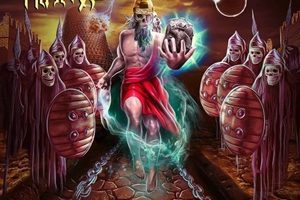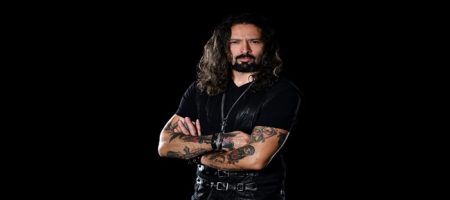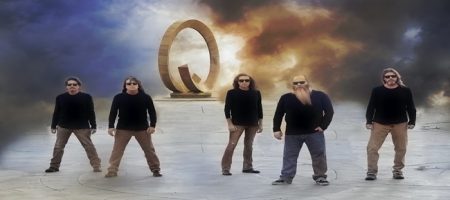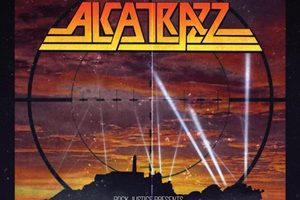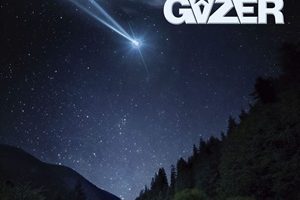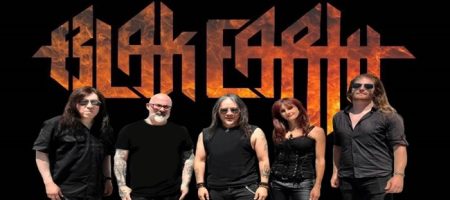Civil War – Power Through History
Tuesday, 7th June 2022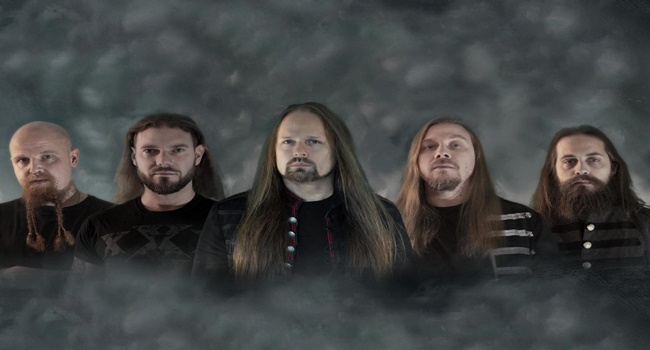
Now four albums into their career, Civil War have been able to establish their own credibility beyond the ex-Sabaton membership. This is high quality power metal in the European mold – stirring melodies, engaging songwriting, stellar virtuoso moments, plus numerous historical themes explored on the lyric front. The latest album Invaders also sees two member additions with guitarist Thobbe Englund and singer Kelly Sundown Carpenter – who galvanize the band’s established style with outstanding performances.
We reached out to Kelly to find out more about the latest record, the research behind specific songs, memories relating to his work with Beyond Twilight, Firewind, and others, lessons learned in difficult situations while remaining professional, plus a ton of talk about his vocal idol Ronnie James Dio.
Dead Rhetoric: Invaders is the fourth Civil War album, and first for you in the group. How did you approach the songwriting and performances this go around – and did you have a specific gameplan or outlook as far as what you wanted to achieve vocally to make things special and distinct compared to previous singer Nils Patrik Johansson?
Kelly Sundown Carpenter: What I wanted to do with the historical stuff and some of the creative things we get into is to make things a bit more personal, more into the story, rather than being a recital of historical facts. As far as vocally, I did the same thing that I kind of always do. I’ll find a melody or subject, dive into that, and try to portray that and act it out – kind of like an actor would. Get into the drama of the situation, put that out there. Par for the course for me, so I didn’t really approach that in that much of a different way.
Dead Rhetoric: Were there any songs that may have been a bit more challenging than others, from either the songwriting perspective or your personal performances?
Carpenter: I think the one we did about “Slaughterhouse 5”, the Kurt Vonnegut novel was really difficult. It’s such a crazy story if you know anything about that story. A lot of weird things about war, post traumatic stress disorder, mainly a big topic there. There’s a weird part in there about an alien abduction, it is such a crazy story. I read the book and then I watched the movie, and I was hanging out then in Sweden with Daniel Mÿhr the keyboardist. I just looked at him and asked what were we going to do with this story, how could we possibly tell the story. I worked a long time to get bits and pieces of everything in there. That was very difficult to get across, but I think we did it. It’s weird, it’s atmospheric, and it’s dark and trippy. That was the strangest and hardest one to make happen.
Dead Rhetoric: Given the historical/wartime stories delivered in the lyrics, do you enjoy the research and effort that comes forth in these songs? Are you conscious to match the atmosphere of specific pieces with the right words and melodies to convey the emotional context as accurately as possible?
Carpenter: Yeah. In particular, because I haven’t really gotten into much historical writing about events before being in Civil War. I didn’t know how to approach this. Particularly with the song “Andersonville”, it’s very touching as I had to do a lot of research on that. What happened in that Civil War confederate prison, the horrible conditions, all of the bravery of the people that were there. I read letters that they wrote the soldiers and prisoners had written to their wives, very touching. It was important to get that across. And for a lot of the Native American themes that are running together throughout the album, I did a lot of research on their culture and the kind of poetic way that they see life. Which I have always admired their culture, I got a chance to really dig more in on that. It was quite rewarding to get into it because like I said I would normally write about inner universe stuff. This time it’s about concrete events that are very specific. You try to put yourself in the place of the people that were in those circumstances and try to deliver that as best as you can.
Dead Rhetoric: Was it an easy process to decide which songs you would release as the lyric videos to introduce the record?
Carpenter: We talked to our label about that, and they had some favorites, and we had some favorites of our own. For those songs we put those out there, the higher energy tracks for people to get a sense of what is on the record. The vibes there, because the record overall is very dark. It has mid-tempo stuff, and very atmospheric stuff on it – so we wanted to come out and kick you in the face in the beginning, get you in the door and then you can explore the deeper cuts of the album.
Dead Rhetoric: How did the idea come about to re-visit “Custard’s Last Stand” the reaches back to the band’s self-titled EP in 2012 as a bonus track for Invaders?
Carpenter: The guys were talking about that song, and we’ve done it a few times live. They really like that song, but they felt not a lot of people got to hear it as it was just on the EP. They wanted to get that out there again, and it’s the tenth anniversary that it was first released. It was quite a while back.
Dead Rhetoric: What can you tell me about the cover art this time around?
Carpenter: We really were interested to getting the Native American vibe out there. The overall concept of record is about invaders – that’s the story of mankind. People getting on boats and travelling to other places, taking over people’s stuff. It’s always been such a horrible thing that happens to people – they get invaded, oppressed, and everything. We wanted that theme straight out there – we have the ships coming into their land, to drive home that theme.
Dead Rhetoric: Did you feel like the touring that you did right away with Civil War during 2017-18 allowed the fans to understand where you are coming from and your abilities – making things easier going into this studio album?
Carpenter: I think it did. Another thing that it did was it helped the band come together and really be a solid lineup. I consider us to be a live band, not just a studio band or a project band. It was really important for us to get out there and see what we could do together. I think at least it introduced me to the fans, what I sound like, how I sing, and how we all interact together as a band. It was a really good idea for us to tour, get out there and do all those festival dates and get the machinery going.
Dead Rhetoric: When looking at your work in the metal/hard rock realm, what are some specific albums, tours, guest appearances, festivals, etc. that you consider special and impressive that will remain forever embedded as standout moments in your career?
Carpenter: My first album when I replaced Jorn Lande in Beyond Twilight, which was crazy. That was a huge moment, it was the first time I ever went to Europe – I never had any connections out here. I arrive in Denmark, completely jetlagged, and we did some sessions that lasted sometimes twenty-five to twenty-six hours in a row. That was a crazy adventure. It was well-received and that is a jewel in my crown of my career that went down. Another really important moment for me was joining Gus G with Firewind, doing all that touring and playing all those festivals. That really got me ready to do what I am doing now with Civil War. I got used to the big stages, touring, all the various conditions that you can face on the road. It made me road ready, and that was a big moment for me. Another funny moment for me is being in the band Darkology with Michael Harris and the Harris brothers. We recorded in the same studio where Damageplan and King Diamond had recorded. King had just finished tracking the Give Me Your Soul Please album. The engineer asked me if I was ready to do some vocals. He asked me if I wanted to use the mic that King Diamond used. I said, oh yeah – I do! That was one of those cool moments. You realize when you get into the business how small the world is.
Dead Rhetoric: In a previous interview I saw online, you mentioned that Ronnie James Dio is your number one hero – tell us about your favorite memories regarding this man, his influence on you as a vocalist, and did you ever get the chance to meet him or see him live in concert over the years?
Carpenter: Yes, of course he’s my hero. I remember when I was a kid, I heard “Rainbow in the Dark” on the radio. There was some sort of contest which pitted that song against a song for a hair rock band, but he won against that band. I was a loner kind of kid, very isolated. I would sit in my room listening to Holy Diver over and over again. He was my friend when I had no friends. The more I learned about him, the more I respected him – how he treated his fans, he had such an incredible voice, he could sing like an angel and then turn into a demon. I have modeled my voice after that ability to go from one strength to another – melodic vocals.
I did get to meet him, and it was such a surreal moment for me. I think I tried to talk to him, but I don’t think much came out. I was starstruck. He treated me with so much kindness and genuine interest. He wanted to talk even though my tongue was on the floor, I just couldn’t believe that I was meeting him. He was a sweet, respectful, nice, genuine person, which made me even a bigger fan of his. That’s the way you treat your fans.
Dead Rhetoric: What are the biggest lessons you’ve learned being in so many different bands and situations in the metal landscape? Where do you think you’ve seen the biggest growth as a musician and a person as well?
Carpenter: I think it comes from getting yourself invited to be involved in some very difficult places. Through the luck of being able to do something pretty well, someone will reach out to you, and they will put you in a situation where you are looking around. I was in a project with Bobby Jarzombek, with the people in Beyond Twilight, with Gus G who was the guitarist of Ozzy Osbourne at the time. It really makes you rise to the occasion; you have to swim in the deep water. I think that’s the biggest thing. And I also think being able to relax when the fans are critical of the fact that you are the new guy. You learn not to take that so personally. For the most part they are just upset that their guy has moved on or quit the band, you have to take a little shit. You have to do this with humility and understand it’s not really that personal – the internet is a crazy place. I’ve learned about that too. Just keep a stiff upper lip and keep going. The most important thing is, just be yourself and do what you were going to do anyway. You have to. If you can’t be yourself, you can’t be anybody else.
Dead Rhetoric: Do you see the internet as a blessing and a curse, as far as developing a community but that community having a voice that they feel it’s easier to tear people down than build them back up?
Carpenter: Yeah, it really is. It’s amazing, because the main reason I am on Facebook is to talk to the fans, if I can’t be face to face with them then I can talk to them, say hello, and we can have contact that way. Or to let them know what you are doing. That idea of just because you have an internet connection it means that everybody needs to hear your opinion on banana peels, it can be toxic. It’s something we have to deal with as artists, you can’t complain about it. What people need to understand is that we are not reading the comments anymore. (laughs). We have to keep our heads down, do our work, and keep doing what we are doing. We have to tune out as a result.
Dead Rhetoric: How have you handled the ever evolving, changing landscape of the music industry – what aspects do you enjoy, and what areas (if any) do you believe need more modification or corrections for the greater good of all parties involved in supporting the arts properly?
Carpenter: I think what we have is what we have. I like crowdfunding, I think that’s great when you don’t have a label. Fortunately, we have a great label, they support us very well. You can get support from the people directly. It’s turned into a world where people think they can get the album for free, unless they are diehard people who love the vinyl, get a hard copy of a real CD. You have to find other ways to make things go, music is expensive, and touring is expensive. Supporting everybody by buying some merchandise if you can, that’s what we’ve got. I can’t see anything further on the horizon other than that. We have just adjusted to the new way of doing things anyway.
Dead Rhetoric: Name three albums that epitomize the best aspects of your preferences within the metal landscape – and what has been your favorite concert memory (metal or otherwise) when it came to take in a show purely as a fan in the audience – and what made this show so special and memorable to you?
Carpenter: Okay. Let’s see for albums. Heaven and Hell – Black Sabbath. That is amazing, that is a desert island album for me. It’s just so great, when Ronnie joined the band the musicianship kind of moved up another level, the complexity of the music. It was more fantastical, magical, I love that. I may sound like a one-trick pony, but Long Live Rock ‘n’ Roll – Rainbow. I could go through the whole catalog. It’s very hard to pick three. How can I forget Operation: Mindcrime by Queensrÿche. That’s the whole reason I started singing. I was going with my buddy to a music store that was far away, an hour drive. He put that cassette in, and my jaw dropped open. We listened to that on the way up and back, and I convinced my buddy to just give me his tape. I admit it, I stole his tape (laughs). I wanted to be able to do what Geoff did on that album. I practiced singing in my car with the volume on maximum, all the way up to ten.
My favorite concert memory I think it was the last time I saw Ronnie, for Angry Machines. It was the night I met him; it was an outdoor theater. I went to the front of the stage; you could reach your hand out and put it on the wood of the stage. During the concert, I could feel Ronnie’s boot smacking the stage. Every time I got to see Ronnie live, I smiled like a little kid. That would be my best memory – feeling his boot heel clicking on the stage, connecting with him like that.
Dead Rhetoric: Did the pandemic have any long-term impact when it comes to your priorities in life? And how do you see humanity in general coming out of this extended downtime – do you believe there will be some serious mental health problems that need to be resolved?
Carpenter: Yeah, I think what it’s done is shut everybody down, made them go inside, and made connecting with other people harder. Human beings are social animals, we need to be able to talk to other people, we need that communication and interaction. I think it’s done a lot of damage. I hope that people can get out there again, get back into the flow of life. That’s the hardest thing to do after this lockdown situation. You need to reinvigorate yourself. An object that is at rest tends to remain at rest. An object in motion on the other hand tends to stay in motion. The big thing is you have to rip off that scab and go for it. Get out there again.
I do agree that there has been a lot of damage just from the lack of interaction. No live music, none of that healing stuff that people need. I hope that things get back to normal so that people can get back out there and breathe again.
Dead Rhetoric: Considering you work in a band with ex-Sabaton members – and you have added another ex-Sabaton member with guitarist Thobbe in the band – what is the band chemistry like and how do they handle being associated with such a big band as Sabaton?
Carpenter: The thing I really enjoy about the guys having had that experience in Sabaton, is they are very seasoned. They are very relaxed; they are very professional. They are super pros. They are fun, cool to hang out with. They know exactly what that life is like, so there are no growing pains in that sense. As far as what we do to stand out, it’s what we do naturally. I think of us as a metal band, and that’s a big category. We are going to do whatever interests us, the music that we think sounds good, and we hope everybody likes it. I am super happy for the success of Sabaton, they have been very nice for us. I’m more interested though in doing what we want to do.
Dead Rhetoric: What’s on the agenda for Civil War over the next year or so to support the record? Has work begun in the longer downtime on the next effort so that there won’t be as long of a break as the six years between albums this go around?
Carpenter: Yeah, we are working on some new stuff already. I think we will have some tour stuff coming up pretty soon, some festivals coming along. We have to wait and see how things go, hopefully things open up more. We plan to hit the road with this album, and we are working on some new stuff too.











